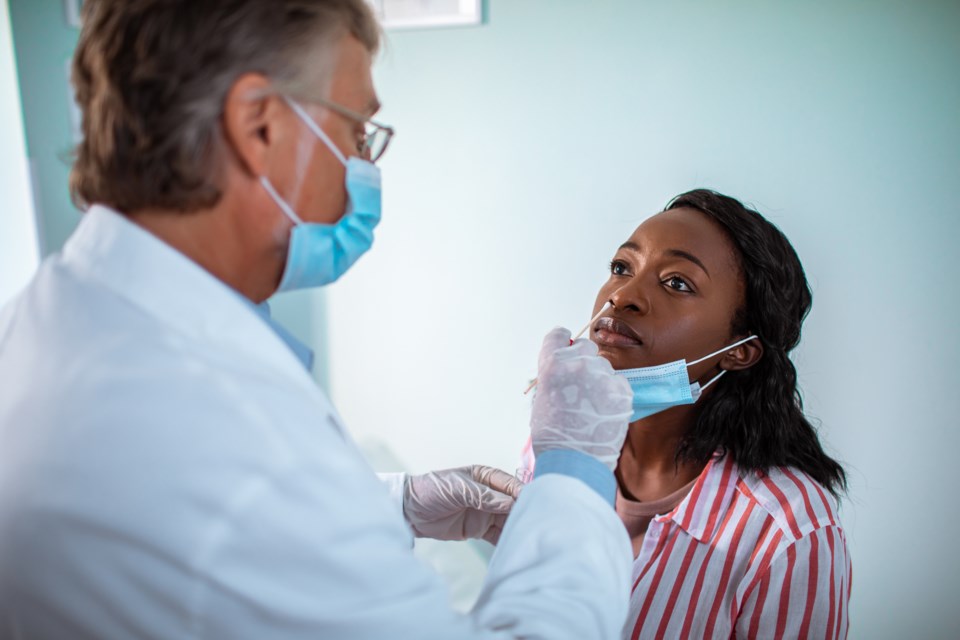More than 2,000 British Columbians are known to have died from the COVID-19 pandemic thanks to another five deaths in the past 24 hours, according to government data.
This grim total, now at 2,001, started on March 9, 2020, when a man in his 80s died at North Vancouver's Lynn Valley Care Centre, where he was a resident. That death was also the first known COVID-19 fatality in Canada.
The five new deaths include:
• three in Fraser Health;
• one in Interior Health; and
• one in Northern Health.
Ages for those who died were not immediately available.
With 360 COVID-19 patients now in B.C. hospitals, including 137 in intensive care units (ICUs), more deaths from the global pandemic in B.C. are almost a certainty.
Fuelling the serious infections are the high number of new cases detected each day.
Health officials In the past 24 hours discovered 743 new infections. With 703 people newly categorized as having "recovered," because they have gone 10 days after first feeling symptoms, and are therefore no longer considered to be infectious, B.C.'s number of people actively battling infections has risen by 40, to 5,969.
In total, 192,491 British Columbians have contracted the disease since the first case was detected in the province in January, 2020.
Of those, more than 95.6%, or 184,121 people, are deemed by the province to have recovered.
Unvaccinated people continue to be largely responsible for much of the disease's spread despite the vast majority of British Columbians being fully vaccinated.
New government data show that between September 30 and October 6, people not fully vaccinated accounted for 69.4% of new cases. Between September 23 and October 6, people not fully vaccinated accounted for 76.7% of hospitalizations.
Across B.C., 88.6% of eligible adults older than 12 have had at least one dose of vaccine, with 82.2% of those eligible people having had two doses, according to the B.C. government.
New vaccinations continue to crawl along at a sluggish pace, compared to a few months ago, largely because the vast majority of British Columbians have already received their needed two doses.
Health officials provided 11,067 doses of vaccine to British Columbians in the past day, with 4,508 doses going to unvaccinated individuals, and 6,559 going to those needing second doses. No data was available for any third doses, which have started to be administered to those who are considered extremely vulnerable, and immunocompromised.
Provincial health officer Bonnie Henry in September said that third doses of vaccine would be available for about 15,000 people in B.C. who are deemed most clinically vulnerable. Those people include individuals who have had organs, bone marrow or stem cell transplants, as well as those who have blood cancers and certain immune disorders.
She announced earlier this week that the province would be expanding its eligible group of immunocompromised people who are eligible for a third dose of the vaccine to approximately 100,000 people, who are considered moderately to severely immunocompromised.
Of the 4,107,666 B.C. residents who have received one dose of vaccine since mid-December, 2020, nearly 92.8%, or 3,811,076, are fully vaccinated, with two doses.
The B.C. government estimated in July that the province's total population is 5,147,712, so Glacier Media's calculation is that 79.8% of B.C.'s total population has had at least one dose of vaccine, and more than 74% of the province's total population has had two doses.
Northern Health, which has a comparatively low vaccination rate, remains the province's hot spot for new and active infections. In contrast, Vancouver Coastal Health, which has a high vaccination rate, has the fewest new and active cases on a per-capita basis.
Glacier Media's math broke down the 743 new infections by health region, for each 10,000 residents (with total new cases in brackets):
• 1.5 in Fraser Health (265);
• 0.6 in Vancouver Coastal Health (69);
• 1.9 in Interior Health (1,129);
• 6.5 in Northern Health (196); and
• 0.8 in Island Health (70).
There were no known new infections in people who normally do not reside in B.C.
The result by health region, for the 5,969 people fighting active infections, for each 10,000 residents (with total new cases in brackets) is:
• 13 in Fraser Health (2,339);
• 6.7 in Vancouver Coastal Health (833);
• 15.2 in Interior Health (1,129);
• 29.8 in Northern Health (893); and
• 8.4 in Island Health (717).
There are 58 active infections in the province in people who normally reside outside B.C.
Two new health-care facility outbreaks were reported, at Cherington Place in Surrey, and Haven Hill Retirement Centre in Penticton.
The outbreak at Royal Inland Hospital in Kamloops has been declared over, leaving the province with 17 active outbreaks in health-care settings and seniors' homes. •



